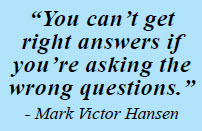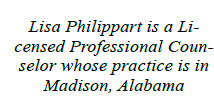 By: Lisa Philippart
By: Lisa Philippart
The foundation of exceptional counseling, in my opinion, is being able to know the client well enough to ask the “right” questions. I have witnessed that a question posed at the precise moment in time, when a client is open to examining change, creates that “aha” moment. And that client is never the same. There is an organization that specifically addresses the skill of questioning called the Inquiry Institute. The Institute teaches everyone, not just therapists, that “great results begin with great questions.” One can learn how to question the thinking process to break those unhealthy patterns in life, and start following a new path of growth and change. I believe that the principles of questioning can and should be applied to the bigger picture, specifically, our culture and society.
Let’s look at the world of mental health and mental illness. I have been practicing counseling for over ten years. I consider one of my best attributes to be the ability to read and assess non-verbals in my clients. This also carries over to my interactions with friends, family, and even those I have just met. (You have now been advised!) This skill is important because many people have difficulty expressing themselves verbally. What is going on in their brains may be challenging to put into words. This is why the field of mental health is so unpredictable. No one can read another person’s mind. The only way I can understand someone is through their words and their actions. And, often times those with a mental illness are unable to express those ideas in their heads. For example, I have had several experiences involving clients with suicidal thoughts. I can tell they are depressed by their body language and how they tell me they are feeling. But the critical piece to moving forward with the client is to ask specifically, “Are you thinking about hurting yourself?” Has the depression crossed over into possible self-harm? Every client to whom I have asked this question, displays a sense of relief. Finally, someone asked.
 Those with mental health concerns benefit from having a therapist who asks the questions that they themselves cannot seem to communicate vocally. Words matter. One client might be searching for how to share her feelings of anxiety. I can help translate what is going on in her mind. One client may hear voices, and be unable to tell the difference between the voices internally versus the voices externally. How can she express that? What are the questions that need to be asked in order to help her verbalize her confusion?
Those with mental health concerns benefit from having a therapist who asks the questions that they themselves cannot seem to communicate vocally. Words matter. One client might be searching for how to share her feelings of anxiety. I can help translate what is going on in her mind. One client may hear voices, and be unable to tell the difference between the voices internally versus the voices externally. How can she express that? What are the questions that need to be asked in order to help her verbalize her confusion?
Recently, tragic events have led to a review of the mental health care system. Questions are correctly being asked about how these tragedies could have been avoided. The topic of mental health care deficiencies always comes up. I am here to tell you that the best therapist in the world cannot read anyone’s mind. And while I may be familiar with my clients’ previous words and behaviors, I cannot completely predict their future actions. I can only help or take action with my clients based on what they tell me and their observable behaviors. For example, school shootings have raised many questions, but so far, few answers. Most of the questions and outrage revolve around gun control, school security, mental health care, and violent video games. But my question is this, “Why are students killing their own classmates?”
 As a counselor, my concern for the future of mental health involves the minds of our collective society, especially our young people. Because of my profession, I am able to experience more deeply the possible root causes of cultural problems. And I am seeing a disturbing trend in our society, which is seeping into my offices. People are becoming disconnected to the world and to others. I’m getting less and less eye contact, both in and out of my offices. Clients want an “app” to fix their problems. Clients think it’s my job is to fix the world, so they don’t have to change. Clients acknowledge spending more time in the “pretend” worlds of their phone and games than in the “real” world. The questions need to be raised now, for the future of our brains, our minds, and most importantly, for humanity.
As a counselor, my concern for the future of mental health involves the minds of our collective society, especially our young people. Because of my profession, I am able to experience more deeply the possible root causes of cultural problems. And I am seeing a disturbing trend in our society, which is seeping into my offices. People are becoming disconnected to the world and to others. I’m getting less and less eye contact, both in and out of my offices. Clients want an “app” to fix their problems. Clients think it’s my job is to fix the world, so they don’t have to change. Clients acknowledge spending more time in the “pretend” worlds of their phone and games than in the “real” world. The questions need to be raised now, for the future of our brains, our minds, and most importantly, for humanity.
By: Lisa Philippart
Licensed Professional Counselor whose practice in in Madison, Alabama







